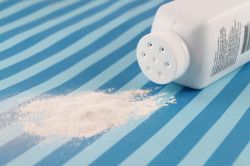 Talcum powder is a popular choice for many women for daily feminine hygiene. Yet this trusted household product may be responsible for causing potentially deadly ovarian cancer in thousands of women each year, studies have shown.
Talcum powder is a popular choice for many women for daily feminine hygiene. Yet this trusted household product may be responsible for causing potentially deadly ovarian cancer in thousands of women each year, studies have shown.
The link between Johnson’s Baby Powder and ovarian cancer dates back as early as 1971, when a study of ovarian cancer patients revealed talc powder particles in their ovarian tissues. Johnson & Johnson and talc mining companies have argued against these findings and have kept their product on the shelves for 40 more years without restriction or warnings of any kind.
Baby Powder and Ovarian Cancer
The main ingredient in baby powder product is talc, a mineral comprised primarily of magnesium, silicon, and oxygen. When ground into powder, talc can absorb moisture and reduce friction. Talcum powder is widely used to help keep skin dry and prevent rashes. When used on the genitals, however, dangerous talc particles can travel into the ovaries and remain trapped for years. These particles can cause inflammation and lead to the growth of ovarian cancer cells.
Research suggests that talcum powder can contribute to baby powder cancer in the ovaries if particles enter the body through the vagina. One review of data reported in the medical journal Cancer Prevention Research indicated that women who regularly use talc-based powder for feminine hygiene might increase their risk of ovarian cancer by about 41 percent.
Following the 1971 study, numerous studies were published pointing to the link between talc and ovarian cancer. In 1992, a study found that regular use of baby powder increased the risk of developing ovarian cancer threefold. In 2010, a Harvard study concluded that talc in baby powder was carcinogenic to humans.
Because of the lack of warning and scientific evidence pointing to the link between ovarian cancer and talcum powder, victims have pursued baby powder cancer lawsuits. The first baby powder cancer lawsuit was won by the plaintiffs in 2013. And a federal jury recently found that talcum contained in some Johnson & Johnson powders contributed to a woman’s ovarian cancer.
The plaintiff in that case was diagnosed with ovarian cancer in 2006 after about 30 years of using talcum-based Johnson & Johnson powders, including the popular Shower to Shower body powder, as part of her personal hygiene routine. The jury found that Johnson & Johnson failed to warn consumers of a link between the use of talc-based powder for feminine hygiene and a heightened risk of ovarian cancer.
Johnson & Johnson’s faces additional baby powder ovarian cancer lawsuits filed on behalf of women who developed ovarian cancer following the regular use of its baby powder products.
Do YOU have a legal claim? Fill out the form on this page now for a free, immediate, and confidential case evaluation. The attorneys who work with Top Class Actions will contact you if you qualify to let you know if an individual lawsuit or class action lawsuit is best for you. [In general, baby powder cancer lawsuits are filed individually by each plaintiff and are not class actions.] Hurry — statutes of limitations may apply.
ATTORNEY ADVERTISING
Top Class Actions is a Proud Member of the American Bar Association
LEGAL INFORMATION IS NOT LEGAL ADVICE
Top Class Actions Legal Statement
©2008 – 2025 Top Class Actions® LLC
Various Trademarks held by their respective owners
This website is not intended for viewing or usage by European Union citizens.
Get Help – It’s Free
Join a Free Baby Powder Cancer Class Action Lawsuit Investigation
If you used Johnson’s Baby Powder, Shower to Shower, or another talcum powder product and were diagnosed with ovarian cancer, you may have a legal claim. Family members of loved ones who died of ovarian cancer can also join. Submit your information now for a free case evaluation.
An attorney will contact you if you qualify to discuss the details of your potential case at no charge to you.












